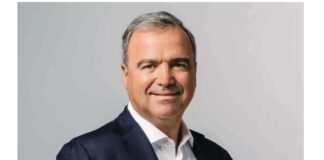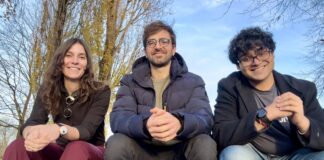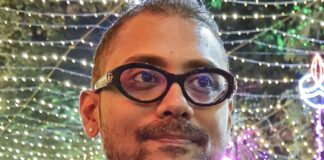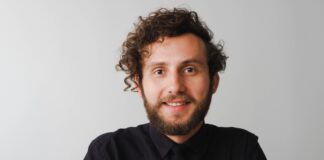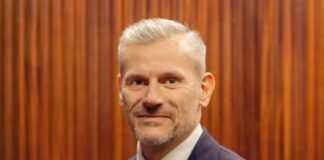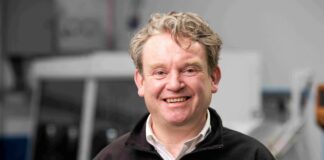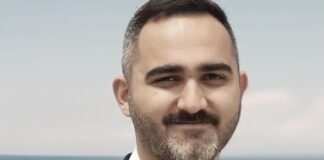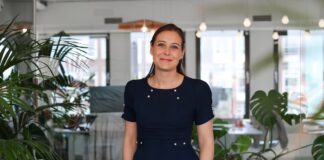Rens launched the Elemental hoodie which will entry into the metaverse as the first 2022 units are accompanied by a Hoodie NFT
Please introduce yourself and your startup Rens to our readers!
I’m Jesse Tran, Co-Founder and CEO of Rens Original, the Finnish eco-startup behind the world’s first sneakers made from coffee waste and recycled plastic. I’ve lived in Finland for 10 years since I moved from Vietnam to pursue my bachelor’s degree at Aalto University. My co-founder – Son Chu – and I founded Rens back in 2018 in Helsinki, Finland. We both have extensive backgrounds in Fashion, manufacturing and e-commerce as Son worked at Zalando and I had founded my previous startup FactoryFinder, which helped to connect small European fashion brands with sustainable manufacturers in Asia.
In 2019, we launched the World’s First Coffee Sneaker via Kickstarter, raising over half a million euros from over 5.000 customers in 100+ countries worldwide and became the all-time largest fashion Kickstarter campaign in the Nordics. Since then, we have been continuously growing and expanding, with Germany and the UK being our top markets in Europe.
Now, we just launched our first apparel collection, the Elemental hoodie, which will also mark our entry into the metaverse as the first 2022 units are accompanied by a Hoodie NFT.
We believe that we are living in an era where the digital and real worlds are merging. We have built Rens as a brand for the young generations and therefore, we need to be in the spaces and worlds that our community is. The metaverse is an extension of the real world and as we provide sustainable products for our community to travel between continents and countries, we want to provide these same products to them to travel between different worlds and universes in the digital space.
How did you get the idea of Rens?
The word “rens” has a few different meanings around the globe and shares a connective thread between them. From the Far East, Confucianism brings us REN (without -s) describing altruism and especially the AWESOME FEELING you get when you do something good for other people. In the West, “rens” is found in Scandinavian languages, meaning “clean, unpolluted, and pure.” These two combine to define Rens: feeling awesome about doing good for people and the world around them.
Why did you decide to start with Rens?
Son and I have been sneakerheads forever. Everything started in a coffee shop when we were discussing how there are so few options for sustainable sneakers that actually look good. Most of the time, sustainability equals sacrificing style and vice versa. That’s when we decided to create the pair of sustainable sneakers that we ourselves want to wear every day. Now we are expanding it to other clothing categories, yet using a combination of waste-based and organic materials mixed with the best innovative technologies.
What is the vision behind Rens?
Rens’ vision is to provide sustainable fashion wearables that are cool and edgy for the young generations no matter if they are in the real world or in the metaverse. Our physical products will be designed and produced by combining waste-based and organic materials and the digital wearables will be created in the greener blockchain technologies. Being part of the metaverse won’t only let our community enjoy their favourite sustainable fashion in any world but also allow us to bring the crypto wealth back to the real world to solve real problems such as environmental and social issues that matter.
How difficult was the start and which challenges did you have to overcome?
We launched our Direct-to-consumer webstore right before the pandemic in early 2020. That was probably one of the most challenging experiences of the entire process, navigating the brands through the COVID “era”. Production was delayed, logistics was heavily interrupted and we struggled to deliver the products to customers in time. However, at the end of the day, we managed to weather the storm and grow the brand ́s global presence via our own website and Zalando with our biggest markets including the US, Germany, the UK, and Finland.
Sustainable materials are way more expensive than synthetic ones and that had been a challenge for us, as we want to offer products that are environmentally friendly but affordable for young people. Choosing Kickstarter and pre-order for our launches also helps the sustainable focus, as we only produce under demand cutting energy usage and material waste.
Rens only uses GRS, FSC and RCS certified materials from the first step of the production until the last-mile shipping in order to reduce climate footprint and it’s not easy to find the right partners and suppliers that comply with these credentials.
Lastly, entering the metaverse as a sustainable brand has been one of our biggest challenges. We are fully aware of the detrimental environmental impact that the Crypto’s proof of work has, that’s why we had to make sure to work with the greenest and most sustainable technologies available in the metaverse. For that matter, we decided to create our NFTs in Polygon, a blockchain that together with Tezos, is the most sustainable option due to their energy-efficient Proof of Stake. On top of that, we will completely offset the energy usage of our NFTs with Aerial to invest in environmental real-world projects.
As people travel from the real world to the metaverse, so do their wealth. However, we have only a real world with real environmental and social problems to solve. By targeting the consumerism in the metaverse, we can create financial assets to re-invest back into the real world to support projects that actually matter.
Who is your target audience?
Our targeted audiences are the younger generations: young millennials, Gen Z and the upcoming Gen Alpha. We aim to educate all the members of these generations that are in the metaverse about sustainability and its importance, as well as educate our sustainable community in the Web3 and its benefits when being sustainable there too.
What is the USP of your startup?
I think that our Unique Selling Point is that we are the only sustainable fashion brand that was born and is yet community-based and that provides wearables both in real life and the metaverse.
Can you describe your typical workday?
Both Son and I work more hours than we should. It is very difficult for startup founders to keep a balance between their business and their professional life but we are learning how to deal with both one step at a time. We mainly focus on meeting our different teams both internal and partners/suppliers which already covers the main part of our days. After that, we manage different paperwork, look for innovations and research new ideas, plan new launches, and do many more tasks.
Where do you see yourself and your startup Rens in five years?
As the CEO, I hope I can educate the mass members of our target about sustainability and Web3 as a positive relationship by proving to them that it is possible. As for Rens, we want to continue to be one of the leading sustainable fashion brands in both the physical and digital worlds.
What 3 tips would you give to founders?
I think it’s very important to listen to your team. As the CEO, I know many general things about multiple disciplines but I’m not a specialist that’s why I work to make sure to listen to every team member’s opinion and feedback both in collective and individual monthly sessions. When we ideate a new product, the whole team is involved from scratch to the final product. Then, we involve our community by pre-launching before producing. Rens is based on community, from the inside and from the outside.
It’s key to learn from your mistakes and improve. Both my co-founder and I had made many mistakes in the way: from choosing materials to management techniques but I’m
proud to say that we always learn our lesson to avoid the same mistake to happen twice. As a startup, most of the time we work by trial error and we learn what works and what doesn’t for our team and for our community.
Offer unique products and services to your audiences and make them participate in them. People want things that make their lives easier and better as well as to feel part of a community.
Thank you Jesse Tran for the Interview
Statements of the author and the interviewee do not necessarily represent the editors and the publisher opinion again.





